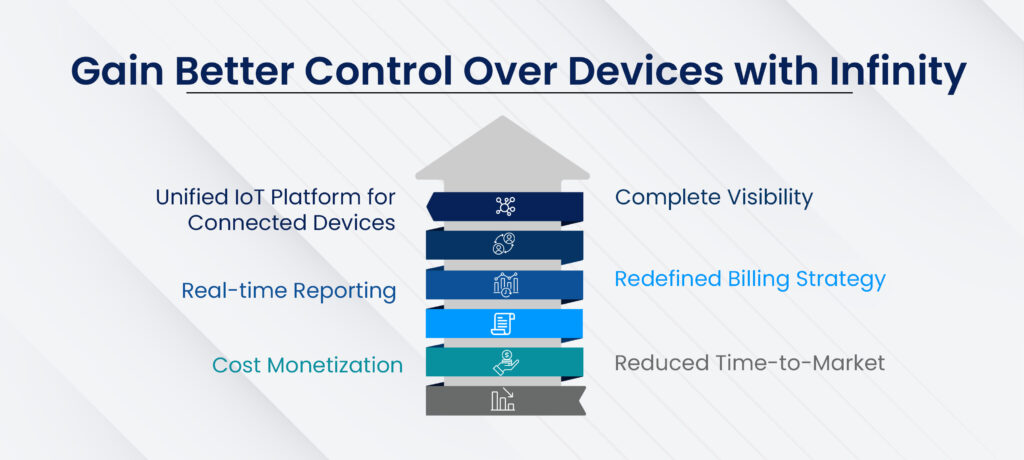Let’s face it! Technology is progressing day by day, and the Internet of Things (IoT) is such a massive part of the ever-evolving technologies. IoT applications in telecom play a vital role as IoT is being integrated into almost every aspect of our lives. Be it corporate offices, homes, cars, or any other security systems. The global IoT Telecom services market is projected to expand from $17.4 billion in 2021 to over $254 billion by 2031. Furthermore, industry experts project that there will be approximately 40 billion connected IoT devices globally by 2030. This highlights a significant impact of IoT in the telecom sector.
If you are a telecom operator or industry professional, it’s important to understand IoT solutions for telecom and how they are redefining the industry, what platforms and strategies can help you utilize their full potential. This comprehensive blog will walk you through IoT applications in telecom, the role of IoT connectivity platforms, and how to choose the right IoT solution.
Why Are IoT Solutions Indispensable for Telecom?
IoT is more than just a tech buzzword in telecom. It’s a business imperative. Communication service providers are uniquely positioned to capitalize on IoT applications in Telecom because they offer the connectivity backbone that IoT devices rely on. Implementing the right IoT solution allows operators to address the following aspects.
Offer New Services:
Telecom operators can offer advanced services like smart asset tracking, remote equipment tracking, and predictive maintenance for enterprise customers by using IoT applications in telecom and machine-to-machine (M2M) connectivity. These services go beyond connectivity. It helps in positioning the operators as a solution provider in verticals like logistics, industrial automation, smart cities, and more.
Improve Operational Efficiency:
Internally, communication service providers can use IoT solutions for telecom to enhance their own infrastructure. For example, IoT sensors provide predictive maintenance and real-time monitoring in network equipment and cell towers. As a result, operational costs and downtime are reduced.
Upgrade Customer Experience:
Carriers can gain deeper analytics and real-time insights with IoT applications in telecom. This real-time data can be used for tailored customer services while ensuring proactive customer support.
For example, IoT connectivity management solution in smart homes or wearables allows telecom providers to ensure a seamless customer experience through proactive management of the connected devices.
Establish Revenue Sources:
Telecom may expand into new areas such as smart cities, urban infrastructure, connected cars, and healthcare IoT. Businesses are the target market for these managed IoT services, which charge extra for value-added services beyond basic connectivity. In short, IoT applications in telecom enable telcos to diversify and avoid being limited to commodity data.
IoT Applications in Telecom
So, one might ask: What can telecom companies do with IoT? Let’s explore key IoT applications in telecom:
The answer spans a wide range of applications in telecom where IoT technology is making a difference. Below are the top IoT use cases and applications that telecom operators are enabling or using.
Smart Cities:
Telecom providers are instrumental in building smart city solutions. They offer connectivity for urban IoT infrastructure like smart street lighting, traffic sensors, waste management systems, and smart utility meters.
Connected Vehicles:
IoT is advancing transportation with connected cars, fleet tracking, and even autonomous vehicles. Telecom IoT networks make the telematics data, real-time navigation updates, and vehicle-to-vehicle communication easily accessible and ensure smart transportation.
Industry 4.0
Predictive maintenance is a key example of Industry 4.0 in action. Sensors send alerts about equipment health so that issues can be addressed proactively. Telecom provided IoT connectivity and edge computing to ensure that the industrial system remains reliable and scalable.
The scope of IoT applications in telecom continues to grow from smart infrastructure to industrial automation use cases.
Telecom IoT Platforms and Connectivity Management
Managing millions of IoT devices is beyond the scope of traditional network applications. That’s why telecom operators prefer to depend on IoT connectivity management platforms. These are the specialized IoT solutions for telecom that enable centralized provisioning, monitoring, and control of large-scale IoT deployments. These platforms ensure secure, high-performance connectivity across devices and networks.
From a business perspective, they offer real-time visibility into device status, data usage, and network performance via dashboards. More significantly, they automate key tasks such as SIM activation, anomaly detection, and data plan checking. To efficiently manage this complexity, telcos are turning to the best IoT connectivity management software to streamline device and SIM operations.
The Future of Telecom IoT starts with a Single, Scalable Platform

6D Technologies has a robust IoT solution for telecom, Infinity. This IoT telecom platform has been developed for communication service providers and enterprises. This solution offers end-to-end control over IoT devices, SIMs, and data through a unified system.
Its depth and operational activity automation set Infinity apart from the competition. CSPs can remotely manage IoT assets with 24/7 monitoring, automated alerts, and rule-based actions to maintain uptime and control costs. It allows full SIM lifecycle management, including activation, suspension, troubleshooting, and policy enforcement.
Infinity is an all-in-one platform developed to cover the entire IoT business workflow. It allows enterprise onboarding, real-time monitoring, SIM and device management, billing, and even a self-care portal for enterprise clients. This unified approach eliminates the need for multiple platforms while offering teleco companies a 360-degree view and control of their IoT applications in telecom.
It’s also worth noting that Infinity’s excellence has not gone unnoticed. It has earned the IoT Platforms Leadership Award in 2022. This recognizes 6D technologies for leadership in the IoT domain.
Beyond the closing words
IoT represents strategic progress for the telecom industry. Telcos can scale operations, automate operational activities efficiently, serve enterprise clients better, and establish new revenue streams with the right IoT connectivity platform. Whether it’s managing millions of devices or supporting smart city initiatives, success hinges on end-to-end visibility, control, and automation.
Platforms like Infinity exemplify what is needed. For example, it provides a centralized, intelligent, and scalable IoT solution for telecom. As the telecom industry advances, the professionals who invest in future-ready IoT solutions today will trailblaze a world of connectivity tomorrow.




